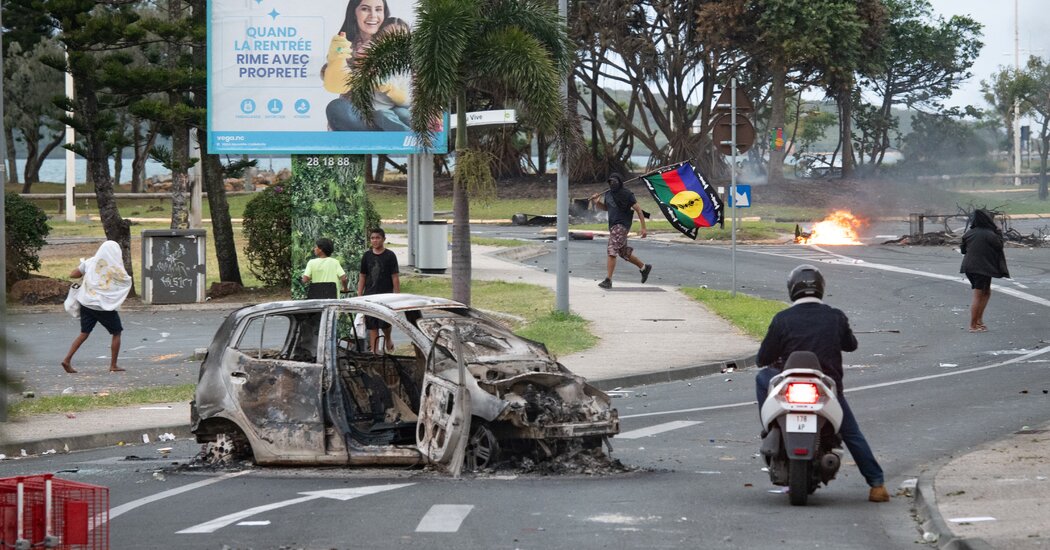The French government declared a state of emergency in New Caledonia on Wednesday as it struggled to quell deadly riots in the semi-autonomous French Pacific territory.
French authorities have undertaken what they called a “massive” mobilization of security forces since violent protests erupted in New Caledonia this week against a proposed amendment to the French Constitution that would change local voting rules in the territory. The French parliament's vote approving the amendment on Tuesday triggered deadly riots overnight.
“The priority is to restore order, calm and serenity,” Gabriel Attal, the French prime minister, told lawmakers on Wednesday.
The French government said more than 1,800 security officers are already in the territory and that 500 reinforcements will arrive in the next 24 hours. At a crisis meeting, Attal said the army would be deployed to protect the ports and airport.
According to the French High Commission, several businesses and public buildings, including schools, were looted or set on fire. Four people died in connection with the clashes, including a law enforcement officer, officials said. And hundreds of other people were injured, including 64 police officers and gendarmes, the High Commission of the Republic of New Caledonia said in a statement. declaration.
Nearly 200 people had been arrested by Thursday local time, the statement said, and the Interior Ministry had issued five warrants against people suspected of sponsoring the riots.
The state of emergency, which will last 12 days, gives authorities greater police powers, allowing them to issue driving bans, place people under house arrest, ban protests and carry out raids without normal judicial oversight.
President Emmanuel Macron, who called a crisis meeting on Wednesday, expressed “strong emotion” over the deaths and gratitude to French security forces, his office said in a statement.
“All violence is intolerable and will be subject to a relentless response” to ensure order is restored, the statement said, adding that Macron welcomed calls for calm from other officials.
Demonstrating the seriousness with which authorities are treating the situation, Macron postponed a trip scheduled for Thursday to inaugurate a new nuclear reactor in Normandy.
France annexed New Caledonia, a group of islands with a population of about 270,000, in 1853. It was one of the few colonies, along with Algeria, that France purposely populated with white settlers. The indigenous Kanak people today make up about 40% of the population, while Europeans make up about a quarter.
The prospect of independence and long-standing social inequality have fueled decades of tension in the territory. The territory, which enjoys rare autonomy in France, has held three independence referendums since 2018; they were all rejected.
After armed conflict claimed dozens of lives in the 1980s – an uprising known as “the Events” – the French government reached a deal with pro-independence militants that promised change.
The proposed constitutional change – which expands French citizens' eligibility to vote in provincial elections – has touched a new nerve. Independence activists in New Caledonia have expressed fears that this could dilute their movement and reflects a more aggressive attempt by the French government to assert its will on the territory.
New Caledonia is a crucial foothold for France in the Indo-Pacific region, and French officials have warned that an independent New Caledonia, rich in vast territorial waters and nickel, could quickly fall under China's influence.
New Caledonia's electoral rolls have been effectively frozen since 2007, and only those who were listed in 1998 were deemed eligible to vote in subsequent local elections. The amendment gives voting rights to all French citizens who have lived in the territory for 10 years, effectively increasing the rolls from around 20,000 to 25,000 people, according to Adrian Muckle, a history professor at Victoria University of Wellington in New Zealand, who is an expert from New Caledonia.
Tensions have risen in recent weeks, with protests turning violent on Monday evening.
In an attempt to ease tensions, Macron's government has promised not to implement the constitutional change – which would require calling a special session of Parliament for a vote – until the end of June. He also invited pro- and anti-independence groups to talks to try to reach a local agreement.
The Kanak et Socialiste National Liberation Front, or FLNKS, the main pro-independence group, condemned the vote on the constitutional amendment in a statement on Wednesday but also appealed for calm.
The French government's offer to organize the talks represents an “opportunity” to ensure that “everyone's requests, including those protesting, can be heard and taken into account.”
The French High Commission in New Caledonia said a curfew imposed on the capital Noumea on Tuesday would remain in place, as would a ban on all public gatherings. Noumea International Airport has been closed since Tuesday, all commercial flights have been canceled and local authorities have said schools will remain closed until further notice.





